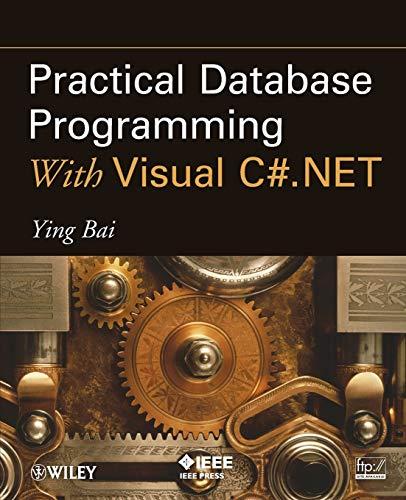Answered step by step
Verified Expert Solution
Question
1 Approved Answer
q CHECK YOUR COMPREHENSION SELECTION 1 Philosophy 447 After reading the selection, answer the following questions with a, b, c, ord. To help you analyze
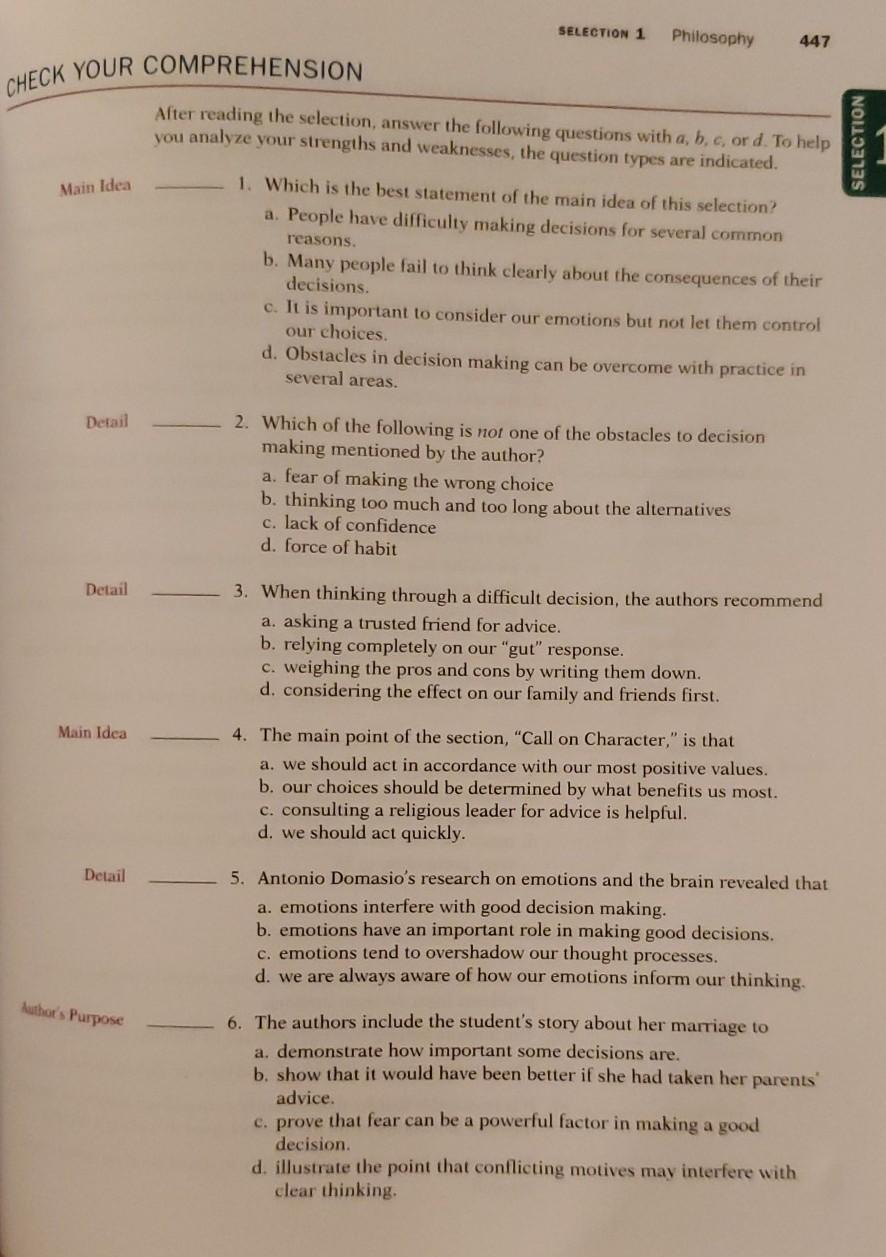
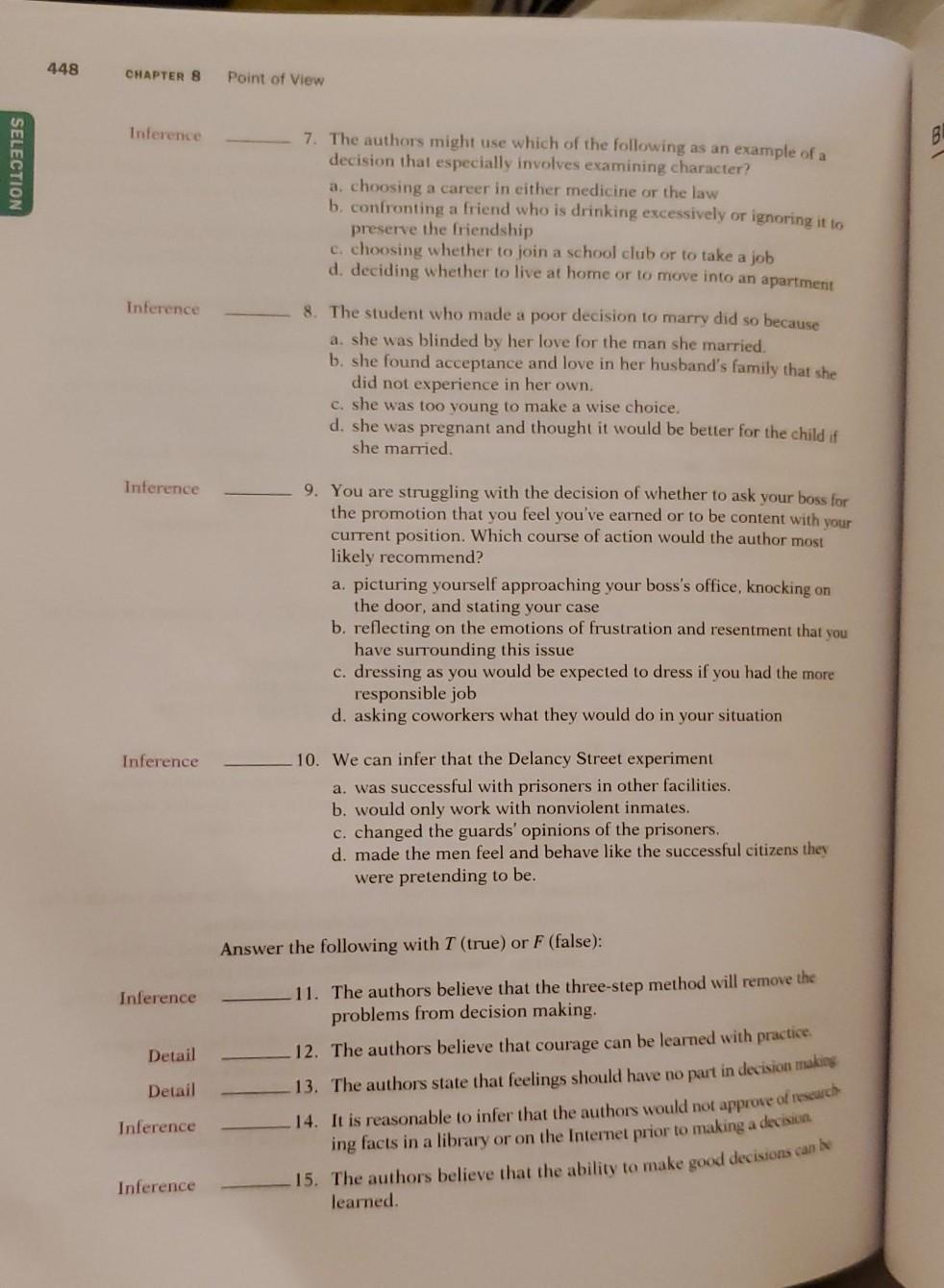
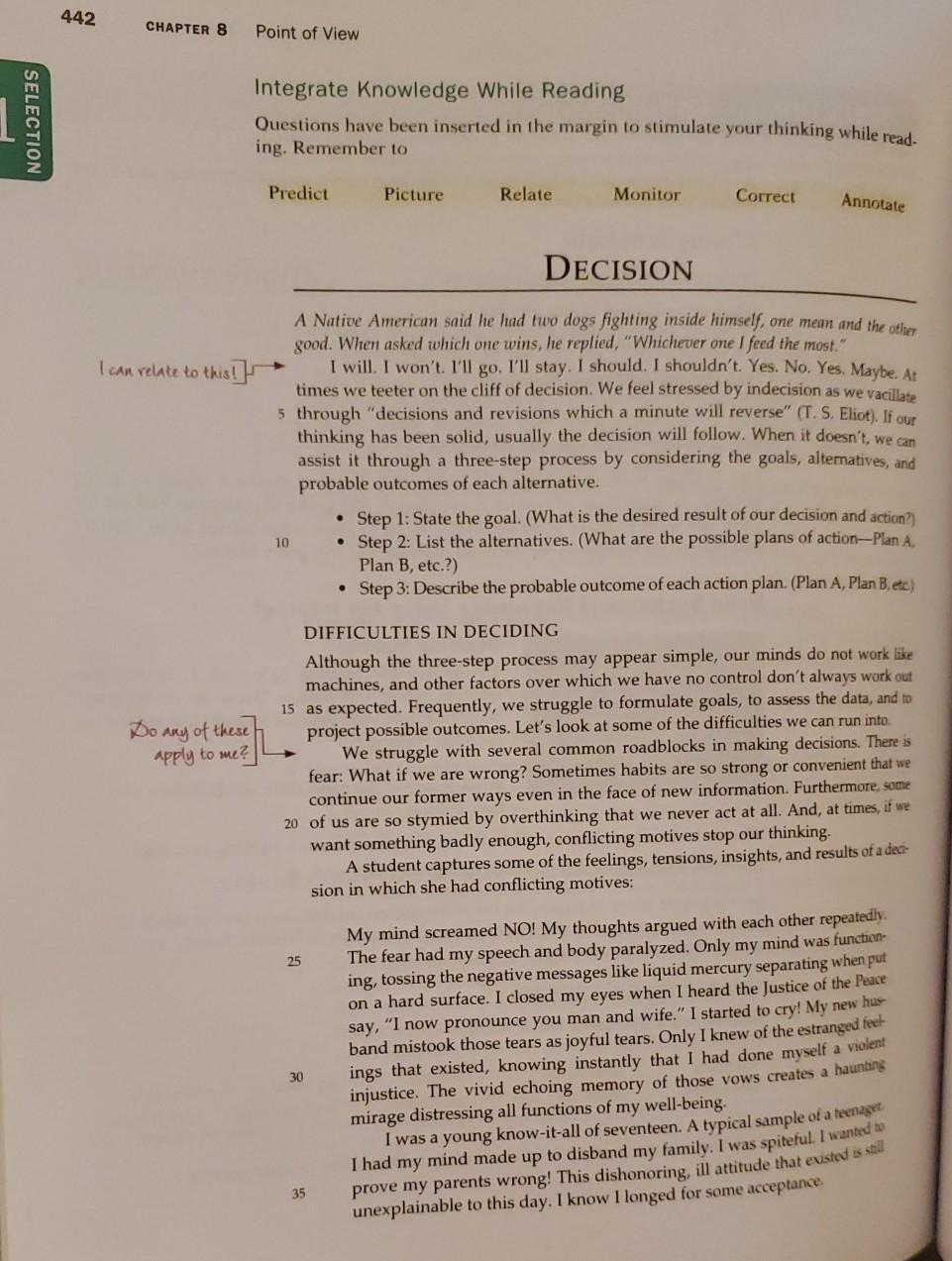
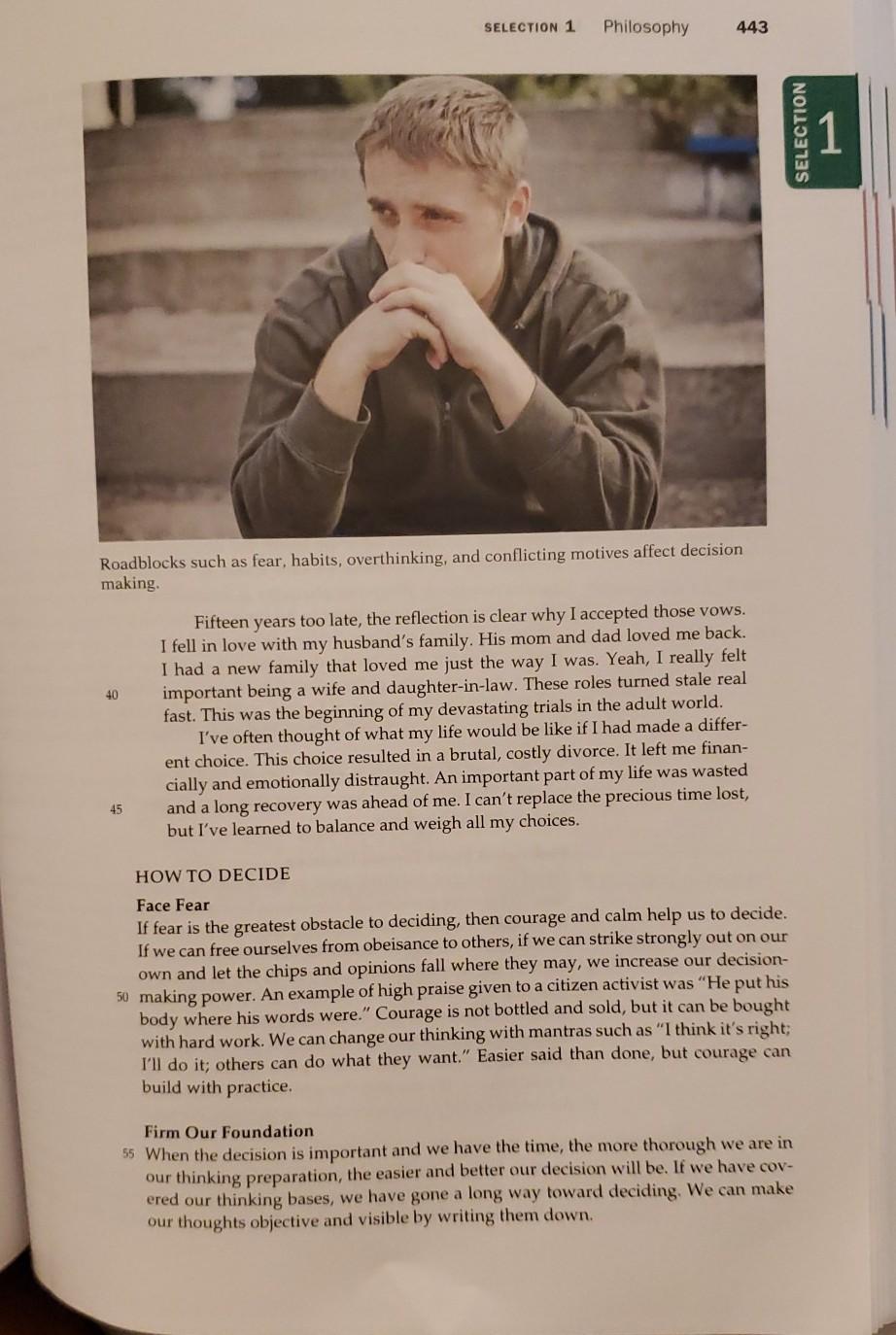
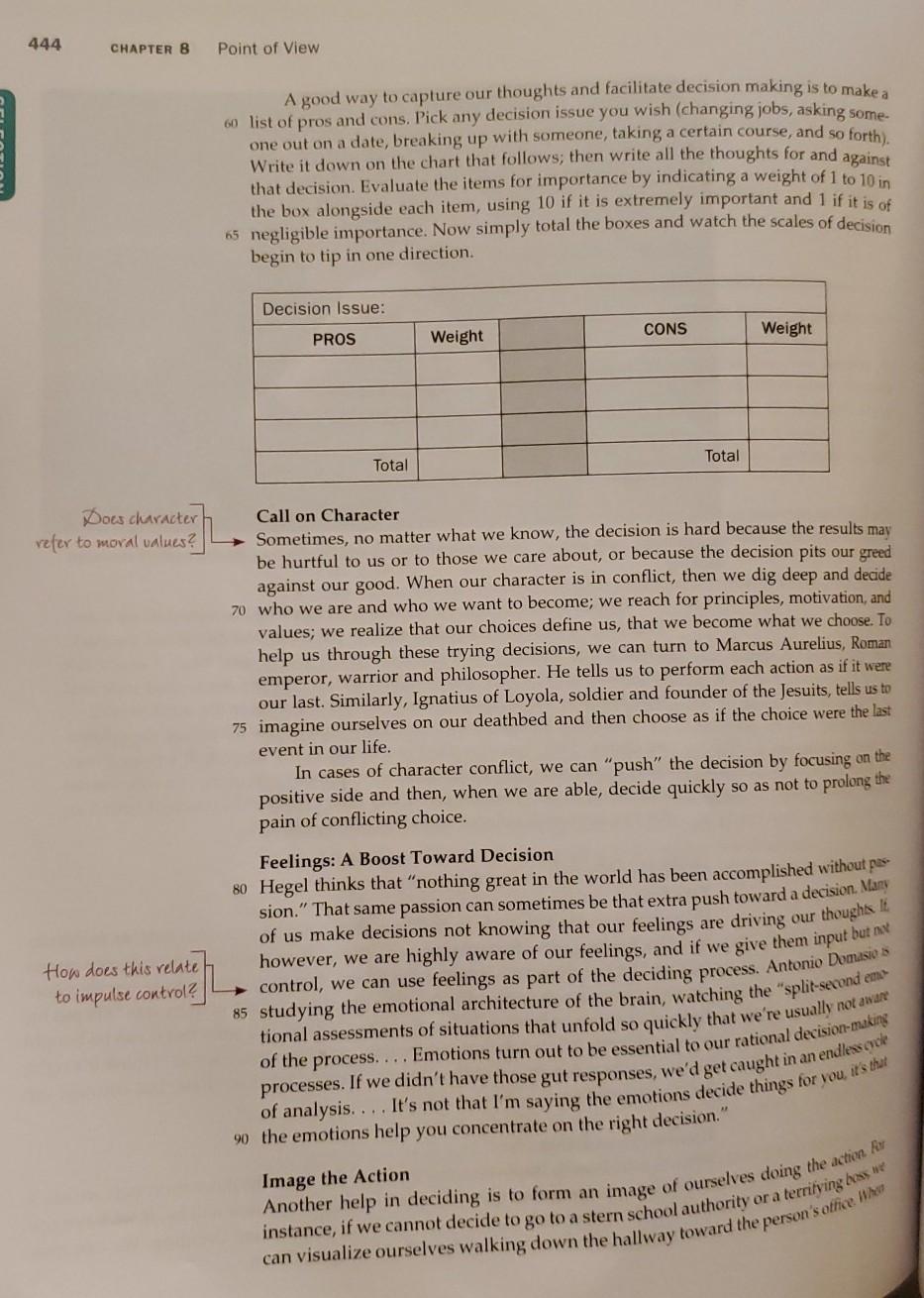
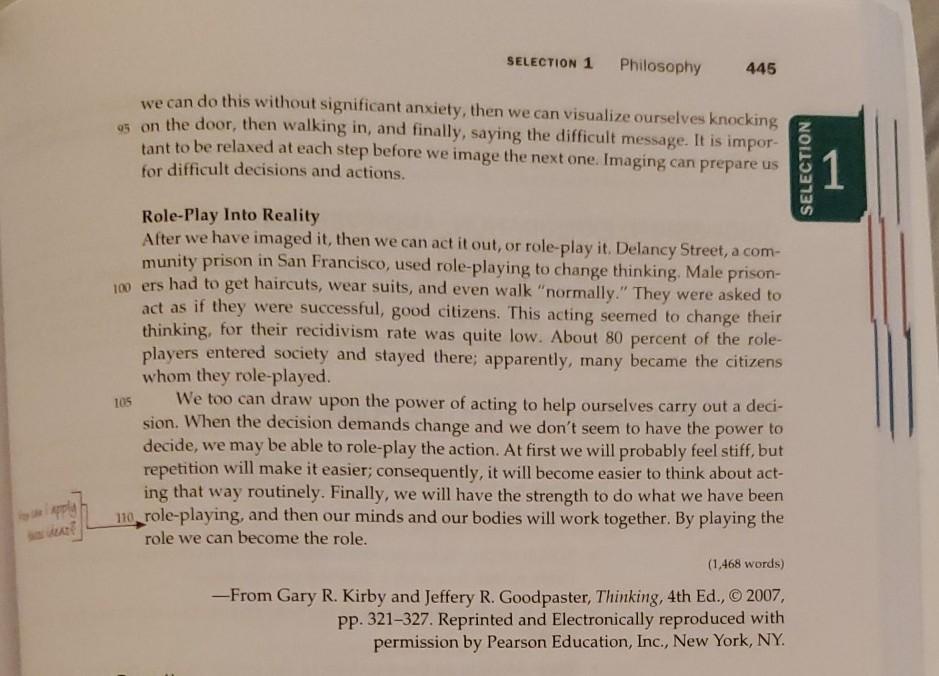
q
CHECK YOUR COMPREHENSION SELECTION 1 Philosophy 447 After reading the selection, answer the following questions with a, b, c, ord. To help you analyze your strengths and weaknesses, the question types are indicated. SELECTION 1 Main Idea 1. Which is the best statement of the main idea of this selection? a. People have difficulty making decisions for several common reasons. b. Many people fail to think clearly about the consequences of their decisions. c. It is important to consider our emotions but not let them control our choices. d. Obstacles in decision making can be overcome with practice in several areas. Detail 2. Which of the following is not one of the obstacles to decision making mentioned by the author? a. fear of making the wrong choice b. thinking too much and too long about the alternatives c. lack of confidence d. force of habit Detail 3. When thinking through a difficult decision, the authors recommend a. asking a trusted friend for advice. b. relying completely on our "gut" response. c. weighing the pros and cons by writing them down. d. considering the effect on our family and friends first. Main Idea 4. The main point of the section, "Call on Character," is that a. we should act in accordance with our most positive values. b. our choices should be determined by what benefits us most. c. consulting a religious leader for advice is helpful. d. we should act quickly. Detail 5. Antonio Domasio's research on emotions and the brain revealed that a. emotions interfere with good decision making. b. emotions have an important role in making good decisions. c. emotions tend to overshadow our thought processes. d. we are always aware of how our emotions inform our thinking, Author's Purpose 6. The authors include the student's story about her marriage to a. demonstrate how important some decisions are. b. show that it would have been better if she had taken her parents advice. c. prove that fear can be a powerful factor in making a good decision d. illustrate the point that conflicting motives may interfere with clear thinking 448 CHAPTER 8 Point of View Inference 8 SELECTION 7. The authors might use which of the following as an example of a decision thal especially involves examining character? a. choosing a career in either medicine or the law b. confronting a friend who is drinking excessively or ignoring it to preserve the friendship c. choosing whether to join a school club or to take a job d. deciding whether to live at home or to move into an apartment 8. The student who made a poor decision to marry did so because a. she was blinded by her love for the man she married. b. she found acceptance and love in her husband's family that she did not experience in her own. c. she was too young to make a wise choice. d. she was pregnant and thought it would be better for the child if she married. Inference Inference 9. You are struggling with the decision of whether to ask your boss for the promotion that you feel you've earned or to be content with your current position. Which course of action would the author most likely recommend? a. picturing yourself approaching your boss's office, knocking on the door, and stating your case b. reflecting on the emotions of frustration and resentment that you have surrounding this issue c. dressing as you would be expected to dress if you had the more responsible job d. asking coworkers what they would do in your situation Inference 10. We can infer that the Delancy Street experiment a. was successful with prisoners in other facilities. b. would only work with nonviolent inmates. c. changed the guards' opinions of the prisoners, d. made the men feel and behave like the successful citizens they were pretending to be. Answer the following with T (true) or F (false): Inference Detail Detail 11. The authors believe that the three-step method will remove the problems from decision making. 12. The authors believe that courage can be learned with practice. 13. The authors state that feelings should have no part in decision making 14. It is reasonable to infer that the authors would not approve of research ing facts in a library or on the Internet prior to making a decisica. 15. The authors believe that the ability to make good decisions can be learned Inference Inference 442 CHAPTER 8 Point of View SELECTION Integrate Knowledge While Reading Questions have been inserted in the margin to stimulate your thinking while read. ing. Remember to Predict Picture Relate Monitor Correct Annotate DECISION I can relate to this! A Native American said he had two dogs fighting inside himself, one mean and the other good. When asked which one wins, he replied, "Whichever one I feed the most." I will. I won't. I'll go. I'll stay. I should. I shouldn't . Yes. No. Yes. Maybe. At times we teeter on the cliff of decision. We feel stressed by indecision as we vacillate 5 through "decisions and revisions which a minute will reverse" (T. S. Eliot). If our thinking has been solid, usually the decision will follow. When it doesn't, we can assist it through a three-step process by considerir the goals, alternatives, and probable outcomes of each alternative. Step 1: State the goal. (What is the desired result of our decision and action) Step 2: List the alternatives. (What are the possible plans of action-Plan A. Plan B, etc.) Step 3: Describe the probable outcome of each action plan. (Plan A, Plan B, etc) 10 Do any of these apply to me? DIFFICULTIES IN DECIDING Although the three-step process may appear simple, our minds do not work like machines, and other factors over which we have no control don't always work out 15 as expected. Frequently, we struggle to formulate goals, to assess the data, and to project possible outcomes. Let's look at some of the difficulties we can run into We struggle with several common roadblocks in making decisions. There is fear: What if we are wrong? Sometimes habits are so strong or convenient that we continue our former ways even in the face of new information. Furthermore, some 20 of us are so stymied by overthinking that we never act at all. And, at times, if we want something badly enough, conflicting motives stop our thinking. A student captures some of the feelings, tensions, insights, and results of a deci sion in which she had conflicting motives: 25 30 My mind screamed NO! My thoughts argued with each other repeatedly. The fear had my speech and body paralyzed. Only my mind was function ing, tossing the negative messages like liquid mercury separating when put on a hard surface. I closed my eyes when I heard the Justice of the Peace say, "I now pronounce you man and wife." I started to cry! My new hus band mistook those tears as joyful tears. Only I knew of the estranged feel ings that existed, knowing instantly that I had done myself a violent injustice. The vivid echoing memory of those vows creates a haunting mirage distressing all functions of my well-being. I was a young know-it-all of seventeen. A typical sample of a teenaget I had my mind made up to disband my family. I was spiteful . I wanted prove my parents wrong! This dishonoring, ill attitude that existent is still unexplainable to this day. I know I longed for some acceptance 35 SELECTION 1 Philosophy 443 SELECTION 1 Roadblocks such as fear, habits, overthinking, and conflicting motives affect decision making 40 Fifteen years too late, the reflection is clear why I accepted those vows. I fell in love with my husband's family. His mom and dad loved me back. I had a new family that loved me just the way I was. Yeah, I really felt important being a wife and daughter-in-law. These roles turned stale real fast. This was the beginning of my devastating trials in the adult world. I've often thought of what my life would be like if I had made a differ- ent choice. This choice resulted in a brutal, costly divorce. It left me finan- cially and emotionally distraught. An important part of my life was wasted and a long recovery was ahead of me. I can't replace the precious time lost, but I've learned to balance and weigh all my choices. 45 HOW TO DECIDE Face Fear If fear is the greatest obstacle to deciding, then courage and calm help us to decide. If we can free ourselves from obeisance to others, if we can strike strongly out on our own and let the chips and opinions fall where they may, we increase our decision- 50 making power. An example of high praise given to a citizen activist was "He put his body where his words were." Courage is not bottled and sold, but it can be bought with hard work. We can change our thinking with mantras such as "I think it's right; I'll do it; others can do what they want." Easier said than done, but courage can build with practice. Firm Our Foundation 55 When the decision is important and we have the time, the more thorough we are in our thinking preparation, the easier and better our decision will be. If we have cov- ered our thinking bases, we have gone a long way toward deciding. We can make our thoughts objective and visible by writing them down. can visualize ourselves walking down the hallway toward the person's office Total 85 studying the emotional architecture of the brain, watching the "split-second em tional assessments of situations that unfold so quickly that we're usually not aware of the process. ... Emotions turn out to be essential to our rational decision-making processes. If we didn't have those gut responses, we'd get caught in an endless cool of analysis. ... It's not that I'm saying the emotions decide things for you, it's the Another help in deciding is to form an image of ourselves doing the action fr instance, if we cannot decide to go to a stern school authority or a terrifying as we 444 CHAPTER 8 Point of View A good way to capture our thoughts and facilitate decision making is to make a 60 list of pros and cons. Pick any decision issue you wish (changing jobs, asking some one out on a date, breaking up with someone, taking a certain course, and so forth) Write it down on the chart that follows; then write all the thoughts for and against that decision. Evaluate the items for importance by indicating a weight of 1 to 10 in the box alongside each item, using 10 if it is extremely important and 1 if it is of 65 negligible importance. Now simply total the boxes and watch the scales of decision begin to tip in one direction. Decision Issue: PROS Weight CONS Weight Total Dous character Call on Character refer to moral values? Sometimes, no matter what we know, the decision is hard because the results may be hurtful to us or to those we care about, or because the decision pits our greed against our good. When our character is in conflict, then we dig deep and decide 70 who we are and who we want to become; we reach for principles, motivation, and values; we realize that our choices define us, that we become what we choose. To help us through these trying decisions, we can turn to Marcus Aurelius, Roman emperor, warrior and philosopher. He tells us to perform each action as if it were our last. Similarly, Ignatius of Loyola, soldier and founder of the Jesuits, tells us to 75 imagine ourselves on our deathbed and then choose as if the choice were the last event in our life. In cases of character conflict, we can "push" the decision by focusing on the positive side and then, when we are able, decide quickly so as not to prolong the pain of conflicting choice. Feelings: A Boost Toward Decision 80 Hegel thinks that "nothing great in the world has been accomplished without pe sion." That same passion can sometimes be that extra push toward a decision. Many of us make decisions not knowing that our feelings are driving our thoughts How does this relate however, we are highly aware of our feelings, and if we give them input but not to impulse control? control, we can use feelings as part of the deciding process . Antonio Domasis 90 the emotions help you concentrate on the right decision." Image the Action SELECTION 1 Philosophy 445 we can do this without significant anxiety, then we can visualize ourselves knocking 45 on the door, then walking in, and finally, saying the difficult message. It is impor- tant to be relaxed at each step before we image the next one. Imaging can prepare us for difficult decisions and actions. SELECTION 1 Role-Play Into Reality After we have imaged it, then we can act it out, or role-play it. Delancy Street, a com- munity prison in San Francisco, used role-playing to change thinking. Male prison- 100 ers had to get haircuts, wear suits, and even walk "normally." They were asked to act as if they were successful, good citizens. This acting seemed to change their thinking, for their recidivism rate was quite low. About 80 percent of the role- players entered society and stayed there; apparently, many became the citizens whom they role-played. We too can draw upon the power of acting to help ourselves carry out a deci- sion. When the decision demands change and we don't seem to have the power to decide, we may be able to role-play the action. At first we will probably feel stiff, but repetition will make it easier; consequently, it will become easier to think about act- ing that way routinely. Finally, we will have the strength to do what we have been 110. role-playing, and then our minds and our bodies will work together. By playing the role we can become the role. (1,468 words) 105 - From Gary R. Kirby and Jeffery R. Goodpaster, Thinking, 4th Ed., 2007, pp. 321-327. Reprinted and Electronically reproduced with permission by Pearson Education, Inc., New York, NY. CHECK YOUR COMPREHENSION SELECTION 1 Philosophy 447 After reading the selection, answer the following questions with a, b, c, ord. To help you analyze your strengths and weaknesses, the question types are indicated. SELECTION 1 Main Idea 1. Which is the best statement of the main idea of this selection? a. People have difficulty making decisions for several common reasons. b. Many people fail to think clearly about the consequences of their decisions. c. It is important to consider our emotions but not let them control our choices. d. Obstacles in decision making can be overcome with practice in several areas. Detail 2. Which of the following is not one of the obstacles to decision making mentioned by the author? a. fear of making the wrong choice b. thinking too much and too long about the alternatives c. lack of confidence d. force of habit Detail 3. When thinking through a difficult decision, the authors recommend a. asking a trusted friend for advice. b. relying completely on our "gut" response. c. weighing the pros and cons by writing them down. d. considering the effect on our family and friends first. Main Idea 4. The main point of the section, "Call on Character," is that a. we should act in accordance with our most positive values. b. our choices should be determined by what benefits us most. c. consulting a religious leader for advice is helpful. d. we should act quickly. Detail 5. Antonio Domasio's research on emotions and the brain revealed that a. emotions interfere with good decision making. b. emotions have an important role in making good decisions. c. emotions tend to overshadow our thought processes. d. we are always aware of how our emotions inform our thinking, Author's Purpose 6. The authors include the student's story about her marriage to a. demonstrate how important some decisions are. b. show that it would have been better if she had taken her parents advice. c. prove that fear can be a powerful factor in making a good decision d. illustrate the point that conflicting motives may interfere with clear thinking 448 CHAPTER 8 Point of View Inference 8 SELECTION 7. The authors might use which of the following as an example of a decision thal especially involves examining character? a. choosing a career in either medicine or the law b. confronting a friend who is drinking excessively or ignoring it to preserve the friendship c. choosing whether to join a school club or to take a job d. deciding whether to live at home or to move into an apartment 8. The student who made a poor decision to marry did so because a. she was blinded by her love for the man she married. b. she found acceptance and love in her husband's family that she did not experience in her own. c. she was too young to make a wise choice. d. she was pregnant and thought it would be better for the child if she married. Inference Inference 9. You are struggling with the decision of whether to ask your boss for the promotion that you feel you've earned or to be content with your current position. Which course of action would the author most likely recommend? a. picturing yourself approaching your boss's office, knocking on the door, and stating your case b. reflecting on the emotions of frustration and resentment that you have surrounding this issue c. dressing as you would be expected to dress if you had the more responsible job d. asking coworkers what they would do in your situation Inference 10. We can infer that the Delancy Street experiment a. was successful with prisoners in other facilities. b. would only work with nonviolent inmates. c. changed the guards' opinions of the prisoners, d. made the men feel and behave like the successful citizens they were pretending to be. Answer the following with T (true) or F (false): Inference Detail Detail 11. The authors believe that the three-step method will remove the problems from decision making. 12. The authors believe that courage can be learned with practice. 13. The authors state that feelings should have no part in decision making 14. It is reasonable to infer that the authors would not approve of research ing facts in a library or on the Internet prior to making a decisica. 15. The authors believe that the ability to make good decisions can be learned Inference Inference 442 CHAPTER 8 Point of View SELECTION Integrate Knowledge While Reading Questions have been inserted in the margin to stimulate your thinking while read. ing. Remember to Predict Picture Relate Monitor Correct Annotate DECISION I can relate to this! A Native American said he had two dogs fighting inside himself, one mean and the other good. When asked which one wins, he replied, "Whichever one I feed the most." I will. I won't. I'll go. I'll stay. I should. I shouldn't . Yes. No. Yes. Maybe. At times we teeter on the cliff of decision. We feel stressed by indecision as we vacillate 5 through "decisions and revisions which a minute will reverse" (T. S. Eliot). If our thinking has been solid, usually the decision will follow. When it doesn't, we can assist it through a three-step process by considerir the goals, alternatives, and probable outcomes of each alternative. Step 1: State the goal. (What is the desired result of our decision and action) Step 2: List the alternatives. (What are the possible plans of action-Plan A. Plan B, etc.) Step 3: Describe the probable outcome of each action plan. (Plan A, Plan B, etc) 10 Do any of these apply to me? DIFFICULTIES IN DECIDING Although the three-step process may appear simple, our minds do not work like machines, and other factors over which we have no control don't always work out 15 as expected. Frequently, we struggle to formulate goals, to assess the data, and to project possible outcomes. Let's look at some of the difficulties we can run into We struggle with several common roadblocks in making decisions. There is fear: What if we are wrong? Sometimes habits are so strong or convenient that we continue our former ways even in the face of new information. Furthermore, some 20 of us are so stymied by overthinking that we never act at all. And, at times, if we want something badly enough, conflicting motives stop our thinking. A student captures some of the feelings, tensions, insights, and results of a deci sion in which she had conflicting motives: 25 30 My mind screamed NO! My thoughts argued with each other repeatedly. The fear had my speech and body paralyzed. Only my mind was function ing, tossing the negative messages like liquid mercury separating when put on a hard surface. I closed my eyes when I heard the Justice of the Peace say, "I now pronounce you man and wife." I started to cry! My new hus band mistook those tears as joyful tears. Only I knew of the estranged feel ings that existed, knowing instantly that I had done myself a violent injustice. The vivid echoing memory of those vows creates a haunting mirage distressing all functions of my well-being. I was a young know-it-all of seventeen. A typical sample of a teenaget I had my mind made up to disband my family. I was spiteful . I wanted prove my parents wrong! This dishonoring, ill attitude that existent is still unexplainable to this day. I know I longed for some acceptance 35 SELECTION 1 Philosophy 443 SELECTION 1 Roadblocks such as fear, habits, overthinking, and conflicting motives affect decision making 40 Fifteen years too late, the reflection is clear why I accepted those vows. I fell in love with my husband's family. His mom and dad loved me back. I had a new family that loved me just the way I was. Yeah, I really felt important being a wife and daughter-in-law. These roles turned stale real fast. This was the beginning of my devastating trials in the adult world. I've often thought of what my life would be like if I had made a differ- ent choice. This choice resulted in a brutal, costly divorce. It left me finan- cially and emotionally distraught. An important part of my life was wasted and a long recovery was ahead of me. I can't replace the precious time lost, but I've learned to balance and weigh all my choices. 45 HOW TO DECIDE Face Fear If fear is the greatest obstacle to deciding, then courage and calm help us to decide. If we can free ourselves from obeisance to others, if we can strike strongly out on our own and let the chips and opinions fall where they may, we increase our decision- 50 making power. An example of high praise given to a citizen activist was "He put his body where his words were." Courage is not bottled and sold, but it can be bought with hard work. We can change our thinking with mantras such as "I think it's right; I'll do it; others can do what they want." Easier said than done, but courage can build with practice. Firm Our Foundation 55 When the decision is important and we have the time, the more thorough we are in our thinking preparation, the easier and better our decision will be. If we have cov- ered our thinking bases, we have gone a long way toward deciding. We can make our thoughts objective and visible by writing them down. can visualize ourselves walking down the hallway toward the person's office Total 85 studying the emotional architecture of the brain, watching the "split-second em tional assessments of situations that unfold so quickly that we're usually not aware of the process. ... Emotions turn out to be essential to our rational decision-making processes. If we didn't have those gut responses, we'd get caught in an endless cool of analysis. ... It's not that I'm saying the emotions decide things for you, it's the Another help in deciding is to form an image of ourselves doing the action fr instance, if we cannot decide to go to a stern school authority or a terrifying as we 444 CHAPTER 8 Point of View A good way to capture our thoughts and facilitate decision making is to make a 60 list of pros and cons. Pick any decision issue you wish (changing jobs, asking some one out on a date, breaking up with someone, taking a certain course, and so forth) Write it down on the chart that follows; then write all the thoughts for and against that decision. Evaluate the items for importance by indicating a weight of 1 to 10 in the box alongside each item, using 10 if it is extremely important and 1 if it is of 65 negligible importance. Now simply total the boxes and watch the scales of decision begin to tip in one direction. Decision Issue: PROS Weight CONS Weight Total Dous character Call on Character refer to moral values? Sometimes, no matter what we know, the decision is hard because the results may be hurtful to us or to those we care about, or because the decision pits our greed against our good. When our character is in conflict, then we dig deep and decide 70 who we are and who we want to become; we reach for principles, motivation, and values; we realize that our choices define us, that we become what we choose. To help us through these trying decisions, we can turn to Marcus Aurelius, Roman emperor, warrior and philosopher. He tells us to perform each action as if it were our last. Similarly, Ignatius of Loyola, soldier and founder of the Jesuits, tells us to 75 imagine ourselves on our deathbed and then choose as if the choice were the last event in our life. In cases of character conflict, we can "push" the decision by focusing on the positive side and then, when we are able, decide quickly so as not to prolong the pain of conflicting choice. Feelings: A Boost Toward Decision 80 Hegel thinks that "nothing great in the world has been accomplished without pe sion." That same passion can sometimes be that extra push toward a decision. Many of us make decisions not knowing that our feelings are driving our thoughts How does this relate however, we are highly aware of our feelings, and if we give them input but not to impulse control? control, we can use feelings as part of the deciding process . Antonio Domasis 90 the emotions help you concentrate on the right decision." Image the Action SELECTION 1 Philosophy 445 we can do this without significant anxiety, then we can visualize ourselves knocking 45 on the door, then walking in, and finally, saying the difficult message. It is impor- tant to be relaxed at each step before we image the next one. Imaging can prepare us for difficult decisions and actions. SELECTION 1 Role-Play Into Reality After we have imaged it, then we can act it out, or role-play it. Delancy Street, a com- munity prison in San Francisco, used role-playing to change thinking. Male prison- 100 ers had to get haircuts, wear suits, and even walk "normally." They were asked to act as if they were successful, good citizens. This acting seemed to change their thinking, for their recidivism rate was quite low. About 80 percent of the role- players entered society and stayed there; apparently, many became the citizens whom they role-played. We too can draw upon the power of acting to help ourselves carry out a deci- sion. When the decision demands change and we don't seem to have the power to decide, we may be able to role-play the action. At first we will probably feel stiff, but repetition will make it easier; consequently, it will become easier to think about act- ing that way routinely. Finally, we will have the strength to do what we have been 110. role-playing, and then our minds and our bodies will work together. By playing the role we can become the role. (1,468 words) 105 - From Gary R. Kirby and Jeffery R. Goodpaster, Thinking, 4th Ed., 2007, pp. 321-327. Reprinted and Electronically reproduced with permission by Pearson Education, Inc., New York, NYStep by Step Solution
There are 3 Steps involved in it
Step: 1

Get Instant Access to Expert-Tailored Solutions
See step-by-step solutions with expert insights and AI powered tools for academic success
Step: 2

Step: 3

Ace Your Homework with AI
Get the answers you need in no time with our AI-driven, step-by-step assistance
Get Started


